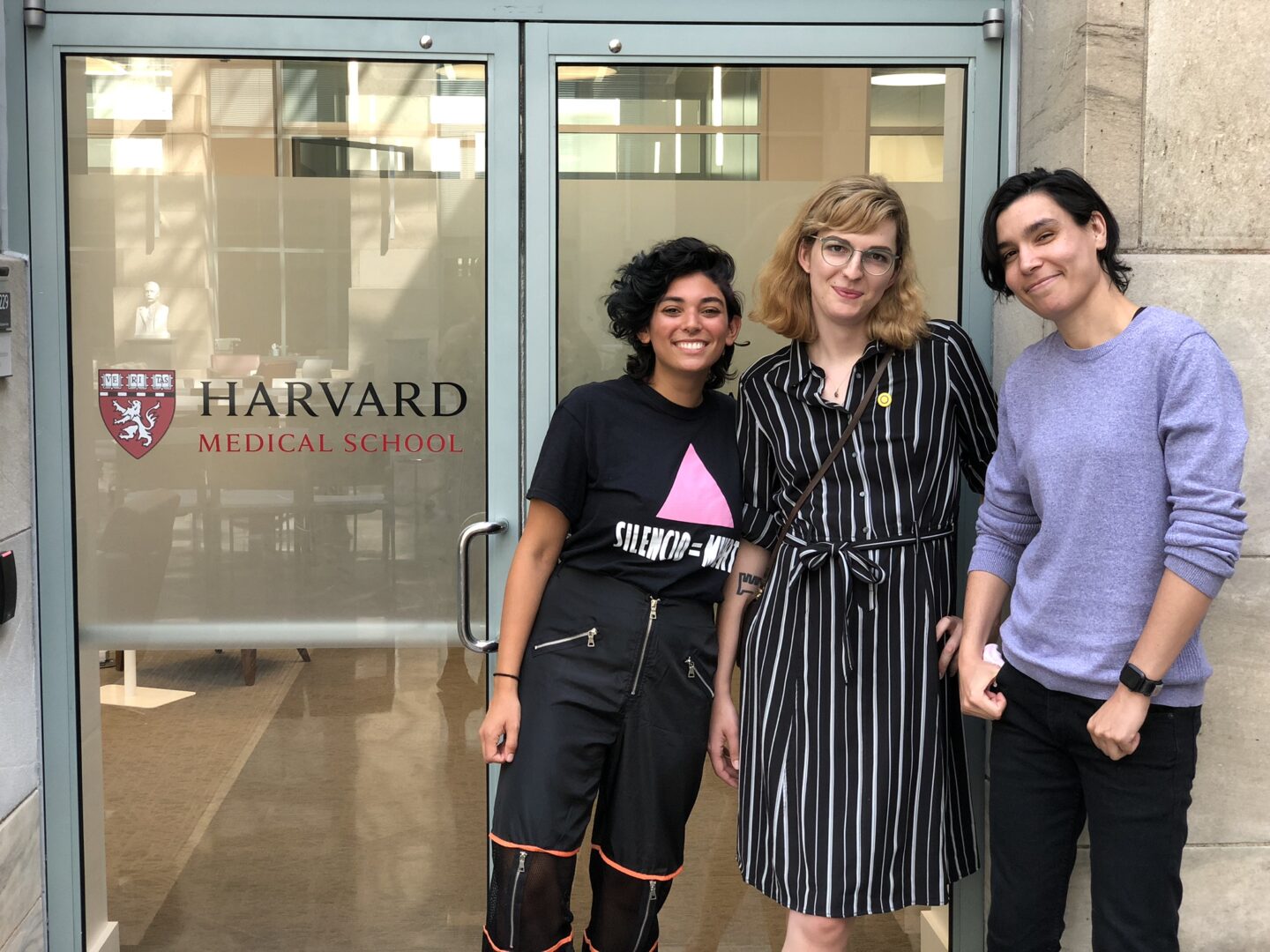Decades of community activism led to the formation of a law and policy organization, which led to meetings with hospitals across the country, which led to passing a resolution with medical students and physician allies, which led to the policy change you see today. Let us show you a peek behind the curtain.
By Kimberly Zieselman,
interACT Executive Director

A second U.S. hospital will stop performing some types of intersex surgery. Boston Children’s Hospital, the largest children’s hospital in Massachusetts and a Harvard University teaching hospital, stated that they will stop performing clitoral and vaginal surgeries on intersex infants. These two types of surgeries represent some, but not all, of the interventions commonly performed on children born with variations in their sex anatomy. The hospital’s news broke with a statement received Wednesday afternoon by a CNN journalist.
As an intersex woman from Massachusetts who was lied to about the “normalizing” surgeries I endured as a child, hearing this news shocked me in the best possible way. I had worked at Boston Children’s Hospital in government relations for years before I learned the truth about my own intersex traits in my 40’s.
Boston’s pledge sets a major example for every hospital still performing surgeries to change intersex minors’ sex traits before they are old enough to participate in decisions. They are the second in the U.S. to do so, following Lurie Children’s Hospital of Chicago this July. Momentum really does come fast.
But the story does not start this week, or even this year. Really, it starts in 1996 when early intersex activists held their first protest in Boston. Through many twists and turns, this momentum led to the 2006 founding of the organization I now direct, interACT: Advocates for Intersex Youth. We’ve been advocating for these types of policy changes, and speaking to those who most resist them, ever since then. We can paint a detailed picture of the constant effort it took to push Boston Children’s to change if we start in 2017.
Parallel Change Starts in Chicago
In July of 2017, interACT and Human Rights Watch released a groundbreaking report on unnecessary surgeries on intersex children. The report was the result of countless interviews with intersex people, their families, and physicians. It remains the most thorough report to-date. Co-authored by an intersex physician, the fact-finding included interviews with clinicians performing intersex surgeries, and with those who weren’t, but felt afraid to speak out against their colleagues’ practices. The report was launched at an in-person event in Chicago, after which interACT’s legal team and I, joined by several Human Rights Watch staff, met with Lurie Children’s Hospital’s lawyers and physicians—including its Chief of Pediatric Urology, Dr. Earl Cheng.
Our request was simple: stop performing clitoral reductions on intersex infants under the age of two.
Our request was simple: stop performing clitoral reductions on intersex infants under the age of two. This move would not protect all intersex children from all of the types of harm that the report revealed to still be occurring nationwide—but such a policy would be a start. One that seemed almost impossible to say no to.
My colleague Alesdair, who was then our Deputy Legal Director, opened the meeting and put forward our proposal. Dr. Cheng seemed unable to process the legitimacy of the ask. As I recounted in my recently released memoir, XOXY, when I began speaking about the harms intersex children were being subjected to by not putting policies like this into place, Dr. Cheng interrupted me, telling me to “leave emotion out of this.” When Sylvan, our Staff Attorney, brought up Illinois’s female genital mutilation law—under which Lurie physicians could be subject to prosecution for performing the clitoral reductions—he insisted that we “set the law aside.”
Our team left Chicago proud that we had put a line in the sand. Dr. Cheng was certainly on alert. Urologists advocating for clitoral surgery on infants had reason to be: stopping could shake up their practice and their institutions’ profits. A multi-center study was published earlier the same year, including co-authors and patient data from eleven institutions performing the surgeries. Two thirds of female-assigned patients had been subjected to clitoral surgery to improve surgeons’ and parents’ ratings of cosmetic outcomes. Over 90% had infant vaginoplasties.
Boston Children’s Hospital’s Progress on Intersex Surgery
A few months later and a few states away, we enjoyed a slightly warmer welcome in Boston. Julie Greenberg, JD, interACT’s current Board president and one of the top U.S. experts in intersex ethics and legal issues—she wrote the legal textbook Intersexuality and the Law and has been cited in hundreds of legal opinions—had received a prestigious invitation to lead the urology department’s grand rounds at Boston Children’s Hospital. She would speak on the ethical issues of intersex surgery. Alesdair and I watched from the audience.

The interACT team poses after a talk on intersex surgery in Boston. From left to right: medical student Casey Orozco-Poore (they/them), interACT Youth member Catherine Graffam (they/she), interACT Law & Policy Director Alesdair Ittelson (he/him).
After an informative session, Julie took questions. A hand quickly shot up. It belonged to Dr. David Diamond, Urologist-in-Chief at Boston Children’s and a co-author on the clitoral surgery study alongside Dr. Cheng. He told Julie that there were several things “wrong” with her talk, and gave his thoughts in front of the hundreds of medical students and professionals in the audience. As an intersex person, it’s heartbreaking to hear someone bending the facts to argue that you shouldn’t have the right to make choices about your own body.
While Julie received glowing feedback from her attendees, Dr. Diamond’s reaction showed a stark difference in how different people in medicine considered ethics information. Medical students and most general practitioners seemed to quickly favor patient informed consent, while urology specialists were the ones digging their heels in to continue infant clitoral surgeries. Dr. Diamond’s harsh words particularly stung me as I sat in the very same hospital auditorium where I had given presentations and participated in events as a loyal BCH employee.
So we still had work to do in Massachusetts, my home state. And work we did. Each coming year, interACT staff and allies gave talks in the Boston area to physicians and students at Boston Children’s Hospital, various Harvard graduate schools, Boston University and Fenway Health, among others. We met with the Attorney General of Massachusetts. We applied as much internal pressure as we could to those who would listen. Those we reached might not have been the heads of urology programs, but each new ally represented one more seed planted.
That education effort propelled several Boston medical students into action. A student group led the charge, proposing a resolution affirming intersex bodily autonomy to the state’s largest medical association, the Massachusetts Medical Society. Doctors in the state, they argued, should do no harm and advocate for intersex people to have the opportunity to make their own informed choices. Our medical allies in Boston zealously advocated for their colleagues to support the effort. I testified at society meetings to support the resolution, and with only an inkling of hope we would prevail as I listed to countless urologists speaking in opposition. However, the policy position passed in 2019, just one year after California became the first state legislature to even recognize the intersex community. We felt more energized than ever.
A Better Future for Intersex Youth
When I look at this victory—the final decision made by Boston Children’s Hospital’s staff to protect intersex children’s rights—I see every one of these moments building the foundation. Each was a stepping stone to this achievement. Our community is still energized, and this announcement is a clear call for further action. We call on Boston Children’s to include all types of intersex surgeries in their protections, and to create programs to support the countless youth and adults who were already harmed.
We’ll keep working until intersex children’s rights are fully protected, at every U.S. hospital and beyond.





